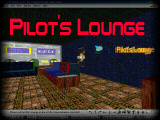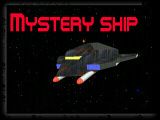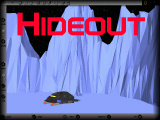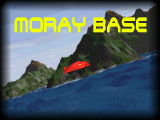Planetmic Presents: |

 |
 |
 |
 |
Files for Download and Support
![]()
VHSB
VHSB Viewer:
The VHSB Viewer works with Windows 3.1 and up. You cannot explore VHSB spaces saved as *.mus files without downloading the viewer. Exploring VHSB spaces saved as *.mus files provide for superior functionality over the same space saved to VRML format. Using the viewer will provide superior performance on slower systems over spaces in VRML format.
Both versions of the viewer are useful and are presented for download in zip format. Unzip either of these files into their own directory. There is no further install except to click on the exe file from within Windows. For Viewer version 2, the exe file is called: VHSB20V.EXE; for Viewer version 1, the exe file is called VHSBVIEW.EXE. When moving around within the 3D space, try the keypad - it seems the most natural method for the majority of users.
![]() Download VHSB Viewer: version 2 (314k) Recommended
Download VHSB Viewer: version 2 (314k) Recommended
![]() Download VHSB Viewer: version 1 (305k)
Download VHSB Viewer: version 1 (305k)
Once you have your viewer you are ready to download VHSB spaces. VHSB spaces can be saved as a simple *.mus file (having no textures or multimedia files)... or can be saved as a "published package". This package, will include the *.mus file, and will also include graphic and multimedia files... what ever the builder has included within the space. Most VHSB spaces are saved in this fashion, within a zip format. The VHSB viewer may also be directly saved with the package - allowing for one simple download and install.
To view any of the VHSB spaces. Download the zipped VHSB space and unzip within its own directory. Authors may include a readme document - check that out; then launch your VHSB Viewer. Finally select the *.mus file and enjoy.
 Download the Pilot's Lounge VHSB package (1 meg). This zip file package includes the VHSB version 2 viewer as well as all Pilot's Lounge files. Relax in a strange lounge aboard a space station... sit on a couch and listen to some relaxing music. Read some advertisements on the walls or check out the weird map room. A treat for lonely space rogues.
Download the Pilot's Lounge VHSB package (1 meg). This zip file package includes the VHSB version 2 viewer as well as all Pilot's Lounge files. Relax in a strange lounge aboard a space station... sit on a couch and listen to some relaxing music. Read some advertisements on the walls or check out the weird map room. A treat for lonely space rogues.
![]()
ISB3
![]() While VHSB was/is totally cool... the future of easy 3D graphics on the web truly belongs to ISB, Parallel Graphics: Internet Space Builder. As mention on the Introduction page, to enjoy VRML *.wrl files (called "worlds"), you need to get a VRML plug-in. The plug-in is automatically launched when the browser encounters a *.wrl file. Currently, there are a variety of VRML plug-ins available... I strongly recommend that you go with Parallel Graphics awesome -free- plug-in, known as Cortona. This viewer is great, easy and intuitive to use... and unlike many VRML viewers... continues to be updated. I suggest you download the manual install file and execute this off-line with all programs closed.
While VHSB was/is totally cool... the future of easy 3D graphics on the web truly belongs to ISB, Parallel Graphics: Internet Space Builder. As mention on the Introduction page, to enjoy VRML *.wrl files (called "worlds"), you need to get a VRML plug-in. The plug-in is automatically launched when the browser encounters a *.wrl file. Currently, there are a variety of VRML plug-ins available... I strongly recommend that you go with Parallel Graphics awesome -free- plug-in, known as Cortona. This viewer is great, easy and intuitive to use... and unlike many VRML viewers... continues to be updated. I suggest you download the manual install file and execute this off-line with all programs closed.
If you haven't got your Cortona VRML viewer yet, simply click on the Parallel Graphics animated icon at right above. (File size is only about 1.3 meg., so a quick download). After downloading your viewer plug-in, please make sure you get the VRML 1.0 Converter. This small utility will allow your Cortona Viewer to display VRML 1.0 files as well (an earlier format of VRML).
Once you have your Cortona viewer installed, there are a couple of settings I suggest you activate. Cortona comes with a test *.wrl file called rose.wrl. Open this world file and right click on the 3D image. You will see Cortona has quite a menu of options. I suggest first time users carefully read through the informative Users Guide, under the Sub-Menu item - Help. Once you're done with that... go under the Preferences Sub-Menu:
(if your system supports one of these... it will increase background sharpness).
When opening ISB3 scenes, check the notation for scene size. Your browser must download to your system the *.wrl file, as well as all textures, so this can take a minute or two depending on your connect speed, etc.
One final note. I am an ISB3 new user enthusiast, not an expert (not yet, anyway)... so don't expect too much here! To exit any of the world files provided, simply click the back button on your browser. Most of all, enjoy my efforts... If you have any feedback at all, I would be happy to hear from you.
 Mystery Ship (271k). Designed for fans of the Frontier/Elite games genre. Visit a strange Elite style ship in deep space. Be like a space walker and float all around the ship, viewing it from all sides. Enjoy the Frontier music... click on the sign "VR Frontier" to hear a message being broadcast from the ship on subspace frequencies.
Mystery Ship (271k). Designed for fans of the Frontier/Elite games genre. Visit a strange Elite style ship in deep space. Be like a space walker and float all around the ship, viewing it from all sides. Enjoy the Frontier music... click on the sign "VR Frontier" to hear a message being broadcast from the ship on subspace frequencies.
 Hideout (274k). Revisit the mystery ship - but this time, hidden away on some frozen planetoid or moon. Could it be waiting for a secret rendezvous? Is her Commander a smuggler, criminal, or just some rogue who likes his solitude? This scene has two cameras available... click on View in the control frame to select.
Hideout (274k). Revisit the mystery ship - but this time, hidden away on some frozen planetoid or moon. Could it be waiting for a secret rendezvous? Is her Commander a smuggler, criminal, or just some rogue who likes his solitude? This scene has two cameras available... click on View in the control frame to select.
 Moray Base (735k). This world contains high-res background files! Thus, increased size. But, if you are patient... you will explore a beautiful scene in 360 degree panavision... "It is the year 3042. Marine Trench Company has developed a variant version of their venerable Moray Starboat, this model called the Moray Surveyor... (Note the hemispherical pods on port and starboard: they contain sensitive mineral survey sensors.) Here we stop time in mid-flight, as the Moray collects data on a beautiful uninhabited earth-like world in a frontier system."
Moray Base (735k). This world contains high-res background files! Thus, increased size. But, if you are patient... you will explore a beautiful scene in 360 degree panavision... "It is the year 3042. Marine Trench Company has developed a variant version of their venerable Moray Starboat, this model called the Moray Surveyor... (Note the hemispherical pods on port and starboard: they contain sensitive mineral survey sensors.) Here we stop time in mid-flight, as the Moray collects data on a beautiful uninhabited earth-like world in a frontier system."
![]()
VRML
General VRML Files, Etc:
VRML is an exciting language to learn. The user merely needs a text editor, and a browser with the VRML plug-in installed. VRML world files are written in plain text. To learn VRML 2.0, a good book or two helps greatly. VRML 2.0 becomes rather advanced in areas such as animation or "moving world" functionality. Luckily, Parallel Graphics provides help in this area with a program called: ISA (Internet Scene Assembler). Still, the diligent users can program much of these events on their own, if ambitious.
There is quite a bit of good information on the web concerning VRML 2.0.
Misc. VRML Files:
- Jupiter II Model in VRML 1.0 (requires converter).
- Brown Hut The first VRML 2.0 Project you can build in the above text VRML 2.0 Sourcebook
![]()
User Support Forum
If you are interested in learning more about utilizing VHSB or ISB3, as well as sharing ideas, meeting fellow users, exchanging techniques, etc., I hope you will visit and join this informative and friendily group I have created and host. Not only might you find searching the message base helpful on ISB3 issues, you may also find useful files for download and utilization within ISB3. And oh... you do not need to own ISB3 to join (though it helps). [NOTE: Group is currently shut down.]
![]() Back to Virtualand Introduction page
Back to Virtualand Introduction page

